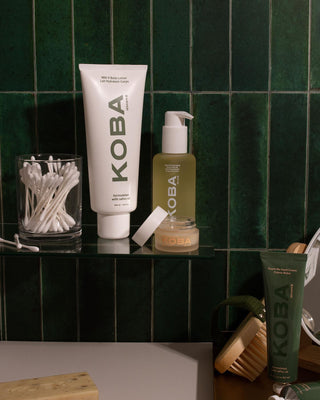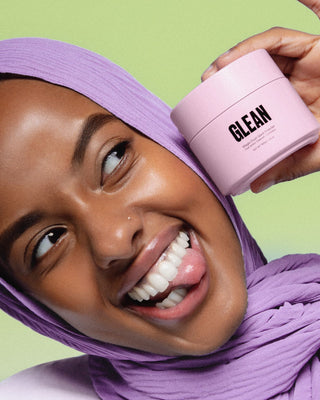One skin concern that we can collectively relate to is hyperpigmentation. Regardless of your skin tone and skin type, you’re likely to experience one of the three types of hyperpigmentation— sun spots, post-inflammatory hyperpigmentation or melasma. Sun spots, as you can guess, comes from an overexposure to UV, triggering the overproduction of melanin that results in the form of patches on the skin. The most common on darker skin is post-inflammatory hyperpigmentation that occurs after acne or any type of scarring (a friendly reminder to stop picking at your pimples). Melasma, which can be more seasonal, is a result of hormonal changes during different life stages like pregnancy, taking birth control and imbalance thyroids.
They’re all tough to navigate in their own way, and even though we’re still learning how to deal with dark spots, we’ve curated a guide with tips from experts, skincare friends and our team to help treat hyperpigmentation one spot at a time.
1. Invest in Gentle Acids
From glycolic acid to vitamin c, gentle acids are the hero ingredients in any routine to treat hyperpigmentation. Not everyone sing their praises due to misuse and misinformation, but when the correct dosage is applied, used in the right routine and your skin is protected, you can get rid of the most stubborn pigmentation. A rule of thump is to apply acids at night as they work harder while you rest. For acids applied during the day, always wear sunscreen to protect from UV and prevent further damages.
2. Use Products with Niacinamide
It’s the new hyaluronic acid in our book. Niacinamide, when paired with both vitamin c and mandelic acid (other acids too), provides even better benefits to the skin when targeting hyperpigmentation. Niacinamide eases inflammation, while vitamin c and mandelic acid work to exfoliate and break apart pigmentation to help even skin tone and brighten those lingering spots. The results of that killer combination you asked? Reduced dark marks and a glowing skin that any Derm would approve of.
3. Wear Sunscreen Everyday
Yes, even during cold, gloomy winter days. Overexposure to the sun is one of the root problems to skin issues and can go hand in hand with inflammation. No matter how well prescribed your routine is, how active and effective the ingredients are, if your skin is unprotected you increase the chances of worsening unwarranted pigmentation and reverse the effects of all the skin-loving acids you invested in. We recommend a multifaceted mineral sunscreen like Meladore Beauty Fortress SPF 30 that protects you from the sun, blue light and other environmental stressors.
4. Stay Hydrated
Our skin is made up of approximately 70 percent water, a key fact when considering why hydration is one of the greatest joys for our skin. When lacking hydration, whether by low water intake or an excess in drying products, our skin shows its dissatisfaction by way of acne breakouts which then leads to post-inflammatory hyperpigmentation. Hydration helps to increase blood flow and circulation that gives a rejuvenating glow to dull skin.



